If you’re counting calories then you may be wondering how much exactly should you eat, and should you be eating the same amount of calories as your BMR?
Eating the same amount of calories as your BMR will help to reduce excess weight because your BMR accounts for around 70% of your daily calorie needs. The accurate BMR can be only established after a 12-hour fast by measuring oxygen consumption in a laboratory setting.
Measuring BMR requires tight environmental control using the metabolic cart. Which means it is very difficult to know the exact number. That’s why relying on counting calories can be off, more than you think.
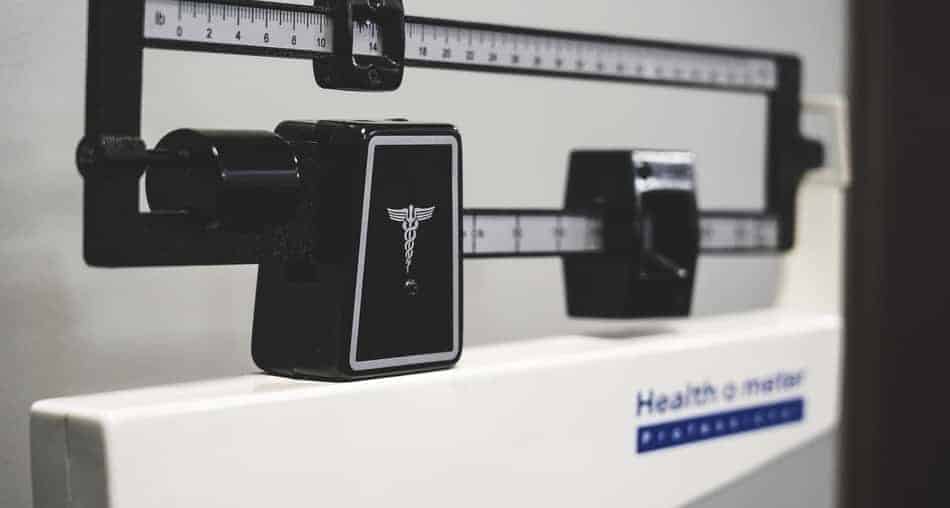
If I Eat My BMR Calories Will I Lose Weight?
If you eat your BMR calories you will lose weight because your BMR is around 70% of your daily calorie expenditure. Another 30% is used for physical activity, non-exercise activity thermogenesis, and thermic effect of food. This means eating your BMR will put you in a caloric deficit.
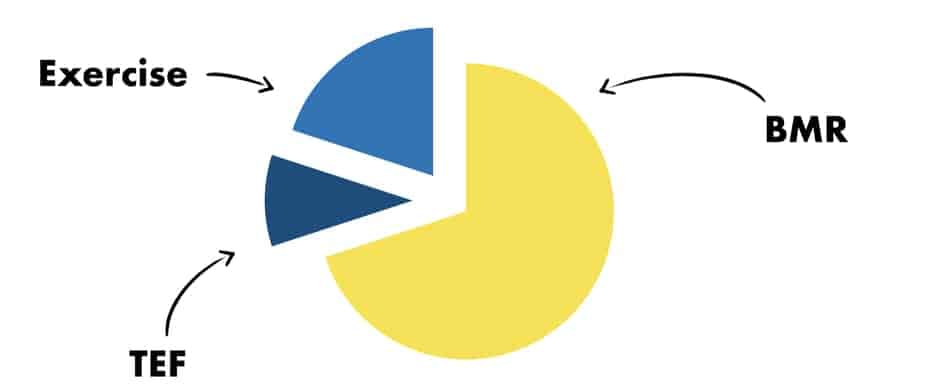
For instance, if your BMR is 1500 calories, and that’s all you eat, you will lose weight.
Because 1500 is only 70% of what your body burns during the day. Another 30% goes for your digestion, food breakdown, nutrients transportation, exercise, and non-exercise activity, and other processes that require energy.
This means, hypothetically if your BMR is 1500, you will burn around 2142 calories (not including exercise) per day. So if you eat only 1500 that puts you in over 500 calorie deficit.
However, it is very difficult to know your exact BMR.
BMR stands for basal metabolic rate. And it’s calculated based on the amount of oxygen that you consume during the non-activity time. For each 1 liter of oxygen, your body will burn around 4.7 calories (source).
Therefore, the more oxygen you consume, the more energy it will be needed to transport all that oxygen throughout the body.
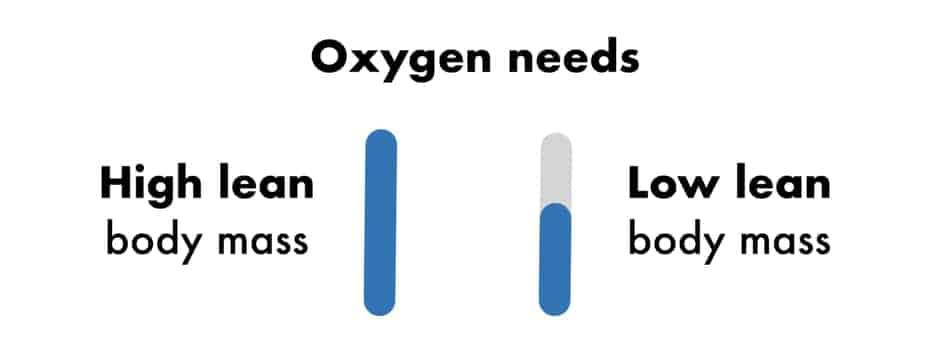
Some tissues, like muscle, need more oxygen. Therefore, having a high lean body mass will ensure you consume more oxygen, even at rest.
Plus, calories from foods vary as well, depending on the food you eat. Some foods have a higher thermic effect than others.
Protein has the highest thermic effect, which means it will need much more calories just to get broken down, digested, and absorbed.
Should I Eat Less Than My BMR To Lose Weight?
You can eat less than your BMR to lose weight because it will put you in a calorie deficit. Being in a calorie deficit means that you consume fewer calories than you expend. Therefore, eating below your BMR will ensure you are in a negative energy balance.
But you need to remember that being in a caloric deficit for a prolonged period of time will lower your basal metabolic rate.
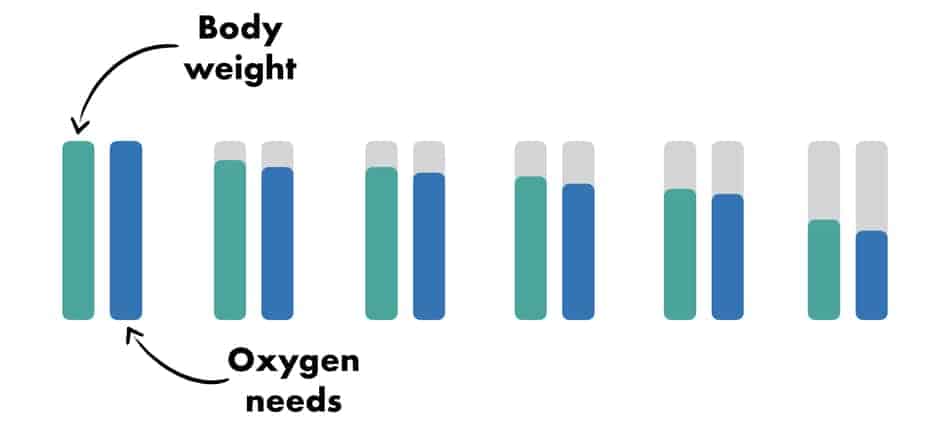
With lower body weight, our need for oxygen consumption will decrease, too (source).
Does BMR Decrease With Weight Loss?
BMR does decrease with weight loss because, with less amount of weight, the body decreases the need for oxygen consumption, therefore, your basal metabolic rate decrease. Calorie needs for BMR are strictly related to the amount of bodyweight you have.
Having less weight on your body will decrease the amount of oxygen that needs to be transported throughout the body.
So paradoxically, the less weight you have, the fewer calories your body burns. This is part of the body’s metabolic adaptation process and it happens despite the diet you’re on.
The easiest way to keep your BMR high while you’re losing weight is to ensure you’re eating enough proteins and doing some resistance training with progressive overload.
High-protein and resistance training stimulate muscle protein synthesis which leads to building muscle (source).
This way you will keep your lean body mass (muscle) high and continue to burn calories, despite being in a calorie deficit.
To learn more about how to get to calorie deficit check out my article.
My BMR Is 1400, How Do I Lose Weight?
If your BMR is 1400, you can lose weight by eating around 1400 calories because this will create a calorie deficit. Apart from BMR, the body also expends calories for other important processes like physical activity, blood flow, cognition, and extraction of nutrients from the food.
So if your BMR is around 1400 calories, eating the same amount will ensure you’re in a negative energy balance. The problem is with knowing the exact number of BMR.
Another way of establishing your calorie expenditure is resting metabolic rate. RMR is similar to BMR (source). It also uses oxygen consumption, but it requires less extreme conditions.
Eating Below BMR But Not Losing Weight
If you’re eating below your BMR but not losing weight it means you either miscalculated your BMR, you’re not tracking your calories properly, or you’re overeating. Stressful situations, distractions, and mindless eating often lead to overeating, without even realizing it.
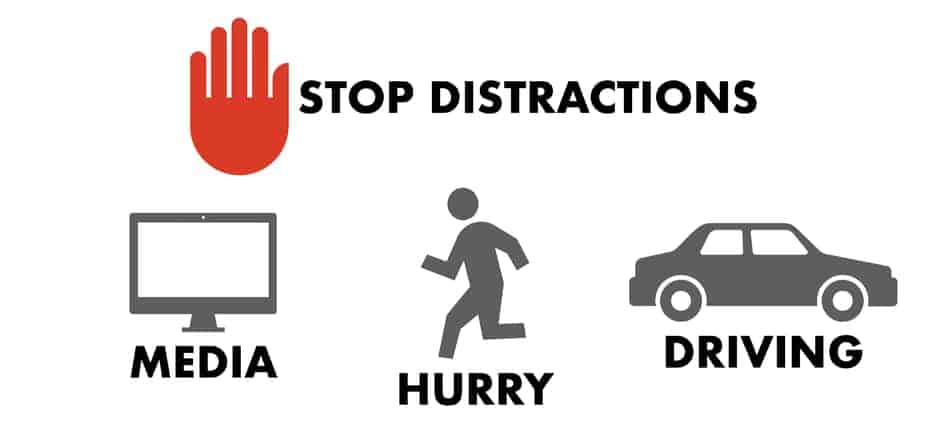
When we are distracted we eat mindlessly.
And with mindless eating is very simple to eat more than usual, without even knowing it.
USDA Center of Nutrition Policy did a fascinating study on people’s perception versus the actual servings of foods. And with the results is shown that people usually underestimate how much food they eat (source).
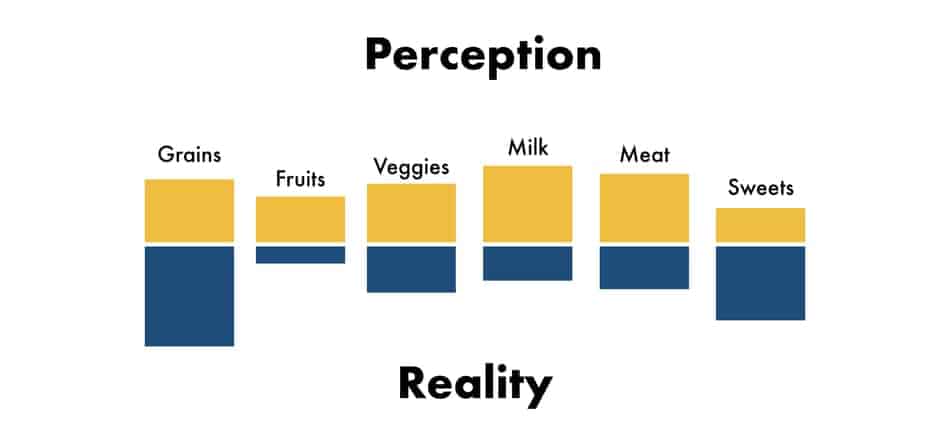
This can happen for a variety of reasons.
And most likely one of them is distractions. Multiple studies show that we eat more when we are distracted, and we even forgot that we eat.
In Conclusion
Eating the same amount of calories as your BMR will ensure that you’re in a calorie deficit. However, with any weight loss keep in mind that your BMR will drop as well.
So initially you may notice a lot of results, but the more you get into the tranches, you can experience that your results plateau.
To keep your BMR as high as you can, while losing body fat, keep your lean body weight (muscle mass) high by consuming a hig-protein diet and perform regular resistance training with progressive overload.
Frequently Asked Questions
Should I Burn The Same Amount Of Calories I Eat?
You don’t have to burn the same amount of calories that you eat because your body will use around 70-80% of the calories just to maintain all the body processes, without you doing anything. Physical activity accounts only for 10-30% calorie expenditure, depending on your activity level.
